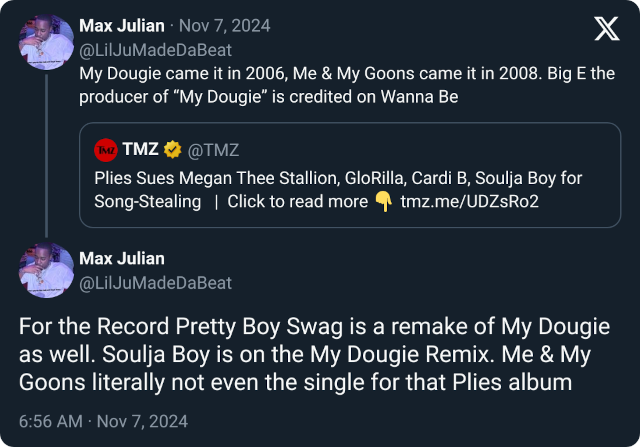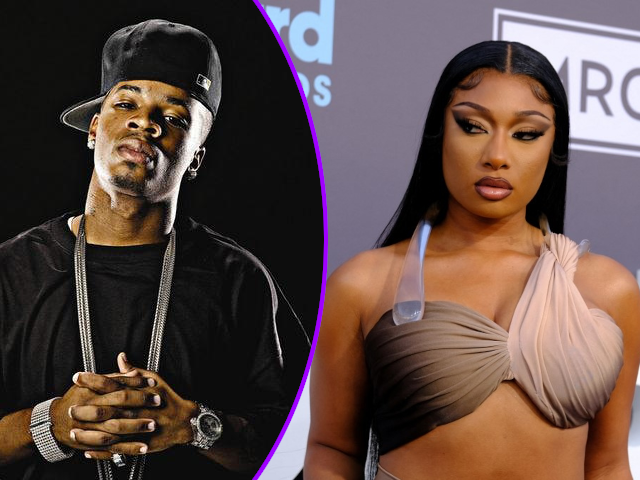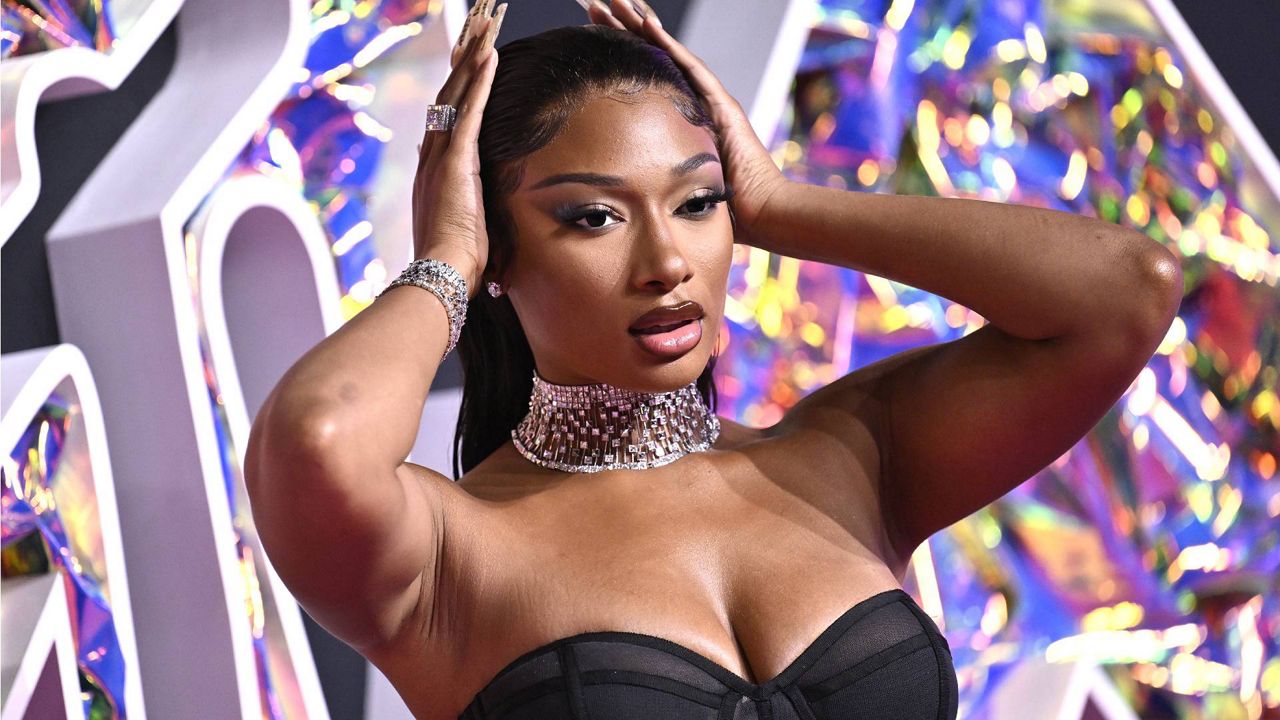On November 6, veteran rapper Plies made headlines when he filed a lawsuit against Megan Thee Stallion, GloRilla, and Soulja Boy, accusing the artists of stealing elements from his 2008 song “Me & My Goons” without obtaining permission. Plies is seeking damages for this alleged copyright infringement, naming Megan Thee Stallion’s label Hot Girl Productions and Soulja Boy’s Collipark Productions in the lawsuit. However, just days later, Megan’s producer Lil Ju Made Da Beat hit back at the rapper with a strong response on social media, defending his position and providing a different perspective on the situation.
Here's ads banner inside a post
The Lawsuit’s Origins
The controversy began when Plies filed the lawsuit, claiming that the song “Wanna Be” by GloRilla and Megan Thee Stallion contained elements of his track “Me & My Goons,” as well as aspects of Soulja Boy’s 2006 hit “My Dougie.” Plies argued that these artists used parts of his song without proper clearance or royalty payments.
However, Lil Ju, the producer of “Wanna Be,” took to social media to refute the allegations. He made it clear that the sample in “Wanna Be” was properly credited to Big E, the producer behind “My Dougie,” not Plies. Lil Ju pointed out that “My Dougie” was released in 2006, two years before Plies’ “Me & My Goons” came out in 2008. He argued that the original source for the sampled elements was Big E, and not Plies, who was merely another artist on the track. Lil Ju further claimed that Plies had no basis for his lawsuit, as “Me & My Goons” wasn’t even the official single from the album Plies mentioned in his complaint.
Lil Ju’s Defense
Lil Ju didn’t just provide a timeline of the songs involved; he also directly challenged Plies’ understanding of the situation. He explained that the song “Wanna Be” was inspired by “My Dougie,” not “Me & My Goons,” and therefore, any potential copyright issue should be directed at Soulja Boy and Big E, not at Megan or GloRilla.
Here's ads banner inside a post
In addition, Lil Ju pointed out that Soulja Boy’s hit “Pretty Boy Swag” was also a remake of “My Dougie,” further complicating the matter for Plies. “If Plies is going to sue us, why isn’t he suing Soulja Boy?” Lil Ju asked, highlighting the inconsistencies in Plies’ legal claims.
Furthermore, Lil Ju questioned the core of Plies’ lawsuit, noting that the song Plies referred to, “Me & My Goons,” was not even the lead single from the album in question, thus weakening Plies’ argument. According to Lil Ju, Plies’ lawsuit lacked sufficient merit, and his accusations were based on a misunderstanding or misrepresentation of the facts.
Lil Ju’s Confidence and the Bigger Picture
Lil Ju remained confident in his legal standing, asserting that all the proper procedures for clearing the sample were followed. He stressed that “Wanna Be” had credited Big E, the producer of “My Dougie,” and not Plies. In his eyes, Plies’ lawsuit seemed more like an attempt to cash in on the success of “Wanna Be,” which had become a massive hit, rather than a genuine concern about copyright infringement.
Here's ads banner inside a post
“Wanna Be” became a huge success when it dropped in April 2024, peaking at number 11 on the Billboard Hot 100 and becoming GloRilla’s highest-charting single as a lead artist. It also helped bolster Megan Thee Stallion’s already impressive career, following her chart-topping single “HISS” earlier in the year. The song even received a remix featuring Cardi B, expanding its reach even further.
Copyright Issues and the Music Industry
The lawsuit between Plies and the artists involved highlights an ongoing issue in the music industry: disputes over copyright and sampling. In the world of hip-hop, using samples from older tracks to create something new is a fundamental part of the genre’s creative process. However, determining who owns the rights to a particular sample and who has the right to use it can lead to legal challenges, as seen in this case.
This situation also brings attention to broader concerns about the way copyright laws operate in the music industry, particularly as hip-hop continues to evolve. For many artists, clearing samples and obtaining the necessary permissions can be a complex process. Yet, if this system breaks down, it can lead to costly legal battles that hurt the creative process and the artists involved.
Lil Ju’s defense raises an interesting point: that lawsuits like this one, if unwarranted, could be damaging not just to the parties involved but to the music industry as a whole. Legal challenges over sampling can stifle the creative process, leading artists to be more cautious and less willing to experiment with different sounds or ideas for fear of litigation.
The lawsuit filed by Plies has sparked an intense debate about copyright and the ownership of musical elements. While Plies has every right to protect his creative work, the arguments presented by Lil Ju—particularly the timeline of the songs and the proper crediting of samples—undermine Plies’ case. If Lil Ju’s account is accurate, it seems that Plies may have misdirected his legal action, as the issue of sampling appears to lie more with Big E and Soulja Boy than with Megan Thee Stallion and GloRilla.
This case illustrates the complexities of the modern music industry, where legal disputes over copyright are not uncommon. However, it also raises important questions about whether these lawsuits are truly in the best interest of the industry, or if they are simply a way to capitalize on the success of others. As the case unfolds, it will be interesting to see how the courts handle these issues and whether they will continue to shape the way artists navigate the complex world of copyright law.


